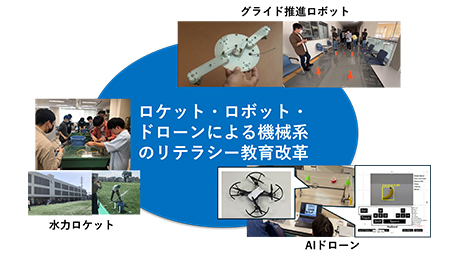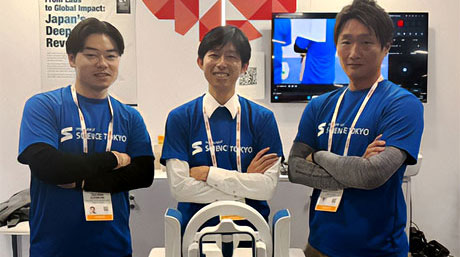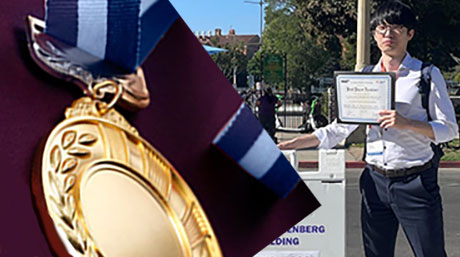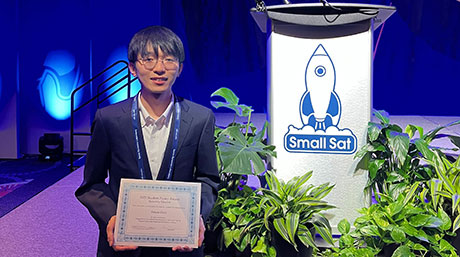Mechanical Engineering News
Tokyo Tech team reach IEEE MTT-Sat Challenge finals
Tokyo Tech's student satellite development team have been selected as finalists in the IEEE MTT-Sat Challenge![]() , a global competition for teams of undergraduate and graduate students to design and build radio frequency and microwave hardware for small satellites.
, a global competition for teams of undergraduate and graduate students to design and build radio frequency and microwave hardware for small satellites.
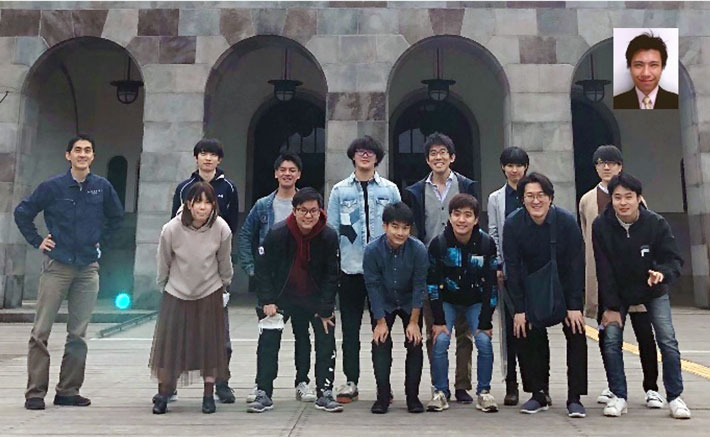
On-campus members of IEEE MAT-Sat Challenge team, advisers Hiraku Sakamoto (far left) and Kenichi Okada (insert)
Team Tokyo Tech's idea — a Ka-band satellite active phased-array transceiver on a deployable textile membrane and calibration for mechanical deformation error — first passed Phase 1, which included 11 teams from around the world. The team also cleared Phase 2, and was then selected as a top-three team in Phase 3. The finalists were announced at the Space Hardware and Radio Conference 2022 on January 18.
The members of the Tokyo Tech satellite development team are as follows.
-
Dongwon You
3rd-year doctoral student, Electrical and Electronic Engineering -
Yuta Takahashi
1st-year doctoral student, Mechanical Engineering -
Shinji Takeda
2nd-year master's student, Mechanical Engineering -
Motoki Moritani
2nd-year master's student, Mechanical Engineering -
Yunosuke Saito
2nd-year master's student, Mechanical Engineering -
Shuhei Koike
1st-year master's student, Mechanical Engineering -
Haruki Hagiwara
1st-year master's student, Mechanical Engineering -
Shinya Tamura
1st-year master's student, Mechanical Engineering -
Yuki Takeda
1st-year master's student, Mechanical Engineering -
Kazuki Nagai
4th year, Mechanical Engineering -
Sora Kanamaru
4th year, Mechanical Engineering -
Yuto Shimada
Master of Engineering, March 2021 -
Sae Koide
Master of Engineering, March 2021 -
Masaki Kato
Master of Engineering, March 2021 -
Yuta Ando
Bachelor of Engineering, September 2021
Assistant Professor Atsushi Shirane from the School of Engineering is the team's coordinator, while Professor Kenichi Okada and Associate Professor Hiraku Sakamoto, also from the School of Engineering, act as faculty advisers.
During the IEEE MTT-Sat Challenge, Team Tokyo Tech passed Phase 1, the Call for Ideas phase, in 2020, and then Phase 2, the Proof of Concepts phase, in 2021. With their success in Phase 3, the Proof of Demonstrators phase, they received a grant of USD 33,000 to develop their satellite radio equipment further, and now have a chance to be the only team to proceed to Phase 4. In Phase 4, the single team with the most promising proposal will be given the chance to launch their satellite into orbit.
The Tokyo Tech team's proposal is a compact, light-weight deployable phased-array radio that can be mounted on a nano-satellite in pursuit of next-generation high-speed wireless communications. Conventional deployable phased-array radios require a deployment structure that is both bulky and heavy in order to make the antenna-mounting surface flat. The student team's proposal, achieved through collaboration between electrical and mechanical engineering students, compensates for the mechanical non-planarity electrically and achieves a dramatic reduction in size and weight. The team's proposal was successful in the IEEE MTT-Sat Challenge for the third year in a row and was selected as a finalist among many applications from leading universities around the world. The Tokyo Tech team was lauded for their enthusiasm, the feasibility of their prototype radio, and the innovative nature of the overall proposal to open up the future.
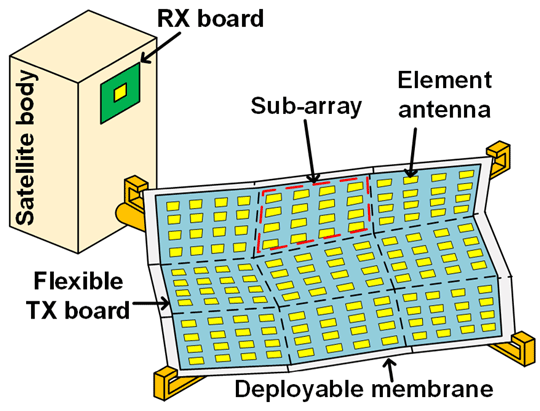
Diagram of proposed satellite active phased-array transceiver on a deployable flexible membrane
Comments from team leader
- Dongwon You
3rd-year doctoral student, Electrical and Electronic Engineering
Satellite communications is being actively researched and is in the spotlight due to its role in high-speed wireless 5th generation (5G) mobile communication systems. When I saw the call for applications for the IEEE MTT-Sat Challenge, I applied because I wanted to launch my own satellite into space. I had a range of difficulties when I started my research, but my work progressed rapidly after I joined forces with mechanical engineering students mentored by Associate Professor Hiraku Sakamoto, who have a wealth of experience in satellite research. The collaboration between different research fields created an unexpected synergy and enabled us to develop a more complete radio system.
The MTT-Sat Challenge has been an invaluable experience for me as I have been able to study not only my own specialty, but also satellite-related topics. Being selected as a finalist would not have been possible without the advice of the professors who supported me in this research and the relentless efforts of my fellow students. I hope that this MTT-Sat Challenge will lead to more active development and research in the space industry.
IEEE Microwave Theory and Techniques Society (MTT-S)
MTT-S is a transnational society with more than 10,500 members and 190 chapters worldwide. The society promotes the advancement of microwave theory and its applications, including RF, microwave, millimeter-wave, and terahertz technologies. For more than 60 years, it has worked to advance the professional standing of its members and enhance the quality of life for all people through the development and application of microwave technology.
- MTT-Sat Challenge | IEEE Microwave Theory and Techniques Society (MTT-S)
- Structural Dynamics Design Laboratory
- Engineering Sciences and Design Graduate Major|Education|Department of Mechanical Engineering, School of Engineering
- Mechanical Engineering Graduate Major|Education|Department of Mechanical Engineering, School of Engineering
- Mechanical Engineering Undergraduate Major|Education|Department of Mechanical Engineering, School of Engineering
- Okada Laboratory
- Department of Electrical and Electronic Engineering, School of Engineering
School of Engineering
—Creating New Industries and Advancing Civilization—
Information on School of Engineering inaugurated in April 2016

